| Listing 1 - 10 of 10 |
Sort by
|
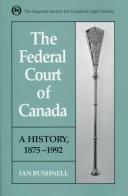
ISBN: 1282025724 9786612025723 1442681268 9781442681262 0802042074 9780802042071 1487586701 Year: 1997 Publisher: Toronto
Abstract | Keywords | Export | Availability | Bookmark
 Loading...
Loading...Choose an application
- Reference Manager
- EndNote
- RefWorks (Direct export to RefWorks)
"The Federal Court of Canada, which existed from 1875 to 1971 under the name Exchequer Court of Canada, occupies a special place in the court structure of Canada. It was founded principally to adjudicate legal disputes in which the Canadian government was involved. Since its change of name in 1971 it has become primarily an administrative appeal court dealing with the review of decisions made by federal administrative tribunals in addition to its existing jurisdictions: admiralty, intellectual property, tax, and other areas. As a federal court within the nation, its very existence has provoked discussion and debate as the various provincial court systems claim a position of primacy within our society for the adjudication of legal disputes." "Central to this history of the Federal Court is an examination of the judges who have sat on its bench, with particular focus on their views regarding the proper approach to decision making. The Federal Court of Canada is a rich resource both for those with a legal background and for those with an interest in the working and history of legal institutions."--Jacket
LAW / Legal History. --- Canada. --- Federal Court of Canada --- Cour fédérale du Canada --- History.
Book
ISBN: 2707607827 9782707607829 Year: 1997 Publisher: Paris : Editions Montchrestien,
Abstract | Keywords | Export | Availability | Bookmark
 Loading...
Loading...Choose an application
- Reference Manager
- EndNote
- RefWorks (Direct export to RefWorks)
Droit --- Droit et politique --- Religion et droit --- Histoire --- Sources --- Law --- Legislation --- History. --- -Legislation --- -Legislative process --- Legislative power --- Acts, Legislative --- Enactments, Legislative --- Laws (Statutes) --- Legislative acts --- Legislative enactments --- Jurisprudence --- History --- -History --- Legislative process --- Legal history --- History and criticism --- Law - History --- Legislation - History
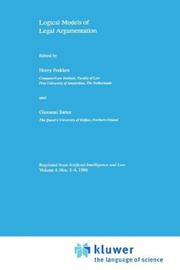
ISBN: 0792344138 9401063907 9401156689 9780792344131 Year: 1997 Publisher: Dordrecht Kluwer Academic
Abstract | Keywords | Export | Availability | Bookmark
 Loading...
Loading...Choose an application
- Reference Manager
- EndNote
- RefWorks (Direct export to RefWorks)
In the study of forms of legal reasoning, logic and argumentation theory long followed separate tracks. `Legal logicians' tended to focus on a deductive reconstruction of justifying a decision, disregarding the dialectical process leading to the chosen justification. Others instead emphasized the adversarial and discretionary nature of legal reasoning, involving reasonable evaluation of alternative choices, and the use of analogical reasoning. Recently, however, developments in Artificial Intelligence and Law have paved the way for overcoming this separation. Logic has widened its scope to defensible argumentation, and informal accounts of analogy and dialectics have inspired the construction of computer programs. Thus the prospect is emerging of an integrated logical and dialectical account of legal argument, adding to the understanding of legal reasoning, and providing a formal basis for computer tools that assist and mediate legal debates while leaving room for human initiative. This book presents contributions to this development. From a logical point of view it covers topics such as evaluating conflicting arguments, weighing reasons, modelling legal disputes as a dialogue game, the role of the burden of proof, the relation between principles, rules, reasons and facts, and the relation between deductive and nondeductive arguments. Written by leading scholars in the field and building on recent developments in logic and Artificial Intelligence, the chapters provide a state-of-the-art account of research on the logical aspects of legal argument.
Law --- Logic. --- Methodology. --- Law—Philosophy. --- Law. --- Political science. --- Theories of Law, Philosophy of Law, Legal History. --- Philosophy of Law. --- Administration --- Civil government --- Commonwealth, The --- Government --- Political theory --- Political thought --- Politics --- Science, Political --- Social sciences --- State, The --- Argumentation --- Deduction (Logic) --- Deductive logic --- Dialectic (Logic) --- Logic, Deductive --- Intellect --- Philosophy --- Psychology --- Science --- Reasoning --- Thought and thinking --- Acts, Legislative --- Enactments, Legislative --- Laws (Statutes) --- Legislative acts --- Legislative enactments --- Jurisprudence --- Legislation --- Methodology --- Law - Methodology.
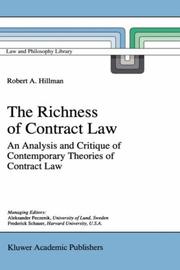
ISBN: 0792343360 0792350634 9401156808 9780792343363 Year: 1997 Volume: 28 Publisher: Dordrecht Kluwer
Abstract | Keywords | Export | Availability | Bookmark
 Loading...
Loading...Choose an application
- Reference Manager
- EndNote
- RefWorks (Direct export to RefWorks)
Scholars have produced a wide variety of theoretical work on contract law. This is the first book to compile it, to present it coherently, to evaluate it, and to supply numerous references to additional sources. The author also offers his own practical perspective that emphasizes contract law's richness and complexity and questions the utility of abstract unitary theories. The author argues that, notwithstanding contract law's complexity, it successfully facilitates the formation and enforcement of private arrangements and ensures a degree of fairness in the process of exchange. Each chapter presents a pair of largely contrasting theories to clarify the central issue of contract law and theory, to set forth the range of views, and to help identify a practical middle ground. Among the contract theories discussed and analyzed are promise, contextual, feminist, formal, mainstream, critical, economic, empirical, and relational. The book should interest legal theorists, practising lawyers, law students, and general readers who want to learn more about contract law and theory.
Contracts --- Contrats --- Philosophy. --- Philosophie --- Philosophy --- Law—Philosophy. --- Law. --- Commercial law. --- Political science. --- Theories of Law, Philosophy of Law, Legal History. --- Commercial Law. --- Philosophy of Law. --- Administration --- Civil government --- Commonwealth, The --- Government --- Political theory --- Political thought --- Politics --- Science, Political --- Social sciences --- State, The --- Business --- Business law --- Commerce --- Law, Commercial --- Mercantile law --- Law --- Law merchant --- Maritime law --- Acts, Legislative --- Enactments, Legislative --- Laws (Statutes) --- Legislative acts --- Legislative enactments --- Jurisprudence --- Legislation --- Law and legislation --- Contracts - United States --- Contracts - Philosophy
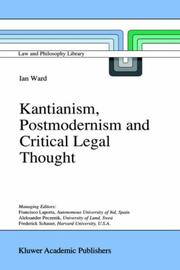
ISBN: 0792347455 9048149118 9401588309 9780792347453 Year: 1997 Volume: 31 Publisher: Dordrecht Boston London Kluwer Academic Publishers
Abstract | Keywords | Export | Availability | Bookmark
 Loading...
Loading...Choose an application
- Reference Manager
- EndNote
- RefWorks (Direct export to RefWorks)
Kantianism, Postmodernism and Critical Legal Thought presents a challenging alternative theory of legal philosophy. The central thesis of the book suggests an accommodation between three of the most influential contemporary theories of law, Kantianism, postmodernism and critical legal thought. In doing so, it further suggests that the often perceived distance between these theories of law disguises a common intellectual foundation. This foundation lies in the work of Immanuel Kant. Kantianism, Postmodernism and Critical Legal Thought presents an intellectual history of critical legal thinking, beginning with Kant, and then proceeding through philosphers and legal theorists as diverse as Heidegger and Arendt, Foucault and Derrida, Rorty and Rawls, and Unger and Dworkin. Ultimately, it will be suggested that each of these philosophers is writing within a common intellectual tradition, and that by concentrating on the commonality of this tradition, contemporary legal theory can better appreciate the reconstructive potential of the critical legal project.
Filosofie van het postmodernisme --- Philosophie postmoderniste --- Postmodernism --- Postmodernisme --- Postmodernisme (esthétique) --- Postmodernisme (filosofie) --- Postmodernisme (philosophie) --- Law --- Critical legal studies --- Philosophy --- History --- Critical legal theory - History. --- Law—Philosophy. --- Law. --- Political science. --- Political philosophy. --- Theories of Law, Philosophy of Law, Legal History. --- Philosophy of Law. --- Political Philosophy. --- Political Science. --- Political philosophy --- Administration --- Civil government --- Commonwealth, The --- Government --- Political theory --- Political thought --- Politics --- Science, Political --- Social sciences --- State, The --- Acts, Legislative --- Enactments, Legislative --- Laws (Statutes) --- Legislative acts --- Legislative enactments --- Jurisprudence --- Legislation --- Law - Philosophy - History --- Critical legal studies - History
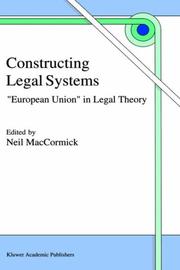
ISBN: 0792347315 9048149037 9401711526 9780792347316 Year: 1997 Publisher: Dordrecht Kluwer
Abstract | Keywords | Export | Availability | Bookmark
 Loading...
Loading...Choose an application
- Reference Manager
- EndNote
- RefWorks (Direct export to RefWorks)
Legal theory has been much occupied with understanding legal systems and analysing the concept of legal system. This has usually been done on the tacit or explicit assumption that legal systems and states are co-terminous. But since the Rome Treaty there has grown up in Europe a `new legal order', neither national law nor international law, and under its sway older conceptions of state sovereignty have been rendered obsolete. At the same time, it has been doubted whether the `European Union' that has grown out of the original `European Communities' has a satisfactory constitution or any constitution at all. What kind of legal and political entity is this `Union' and how does it relate juridically and politically to its member states? Further, the activity of construing or constructing `legal system' and legal knowledge becomes visibly problematic in this context. These essays wrestle with the above problems.
Law --- Philosophy --- 341.2422 --- Ud2 --- -Law --- -Acts, Legislative --- Enactments, Legislative --- Laws (Statutes) --- Legislative acts --- Legislative enactments --- Jurisprudence --- Legislation --- -Philosophy --- Acts, Legislative --- Public international law. --- Law—Philosophy. --- Law. --- Political science. --- Private international law. --- Conflict of laws. --- Public International Law . --- Theories of Law, Philosophy of Law, Legal History. --- Philosophy of Law. --- Private International Law, International & Foreign Law, Comparative Law . --- Choice of law --- Conflict of laws --- Intermunicipal law --- International law, Private --- International private law --- Private international law --- Legal polycentricity --- Administration --- Civil government --- Commonwealth, The --- Government --- Political theory --- Political thought --- Politics --- Science, Political --- Social sciences --- State, The --- Law of nations --- Nations, Law of --- Public international law --- Civil law --- Law - European Union countries - Philosophy
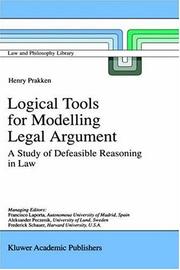
ISBN: 0792347765 9048149282 9401589755 9780792347767 Year: 1997 Volume: 32 Publisher: Dordrecht Kluwer
Abstract | Keywords | Export | Availability | Bookmark
 Loading...
Loading...Choose an application
- Reference Manager
- EndNote
- RefWorks (Direct export to RefWorks)
This book is a revised and extended version of my PhD Thesis 'Logical Tools for Modelling Legal Argument', which I defended on 14 January 1993 at the Free University Amsterdam. The first five chapters of the thesis have remained almost completely unchanged but the other chapters have undergone considerable revision and expansion. Most importantly, I have replaced the formal argument-based system of the old Chapters 6, 7 and 8 with a revised and extended system, whieh I have developed during the last three years in collaboration with Giovanni Sartor. Apart from some technical improvements, the main additions to the old system are the enriehment of its language with a nonprovability operator, and the ability to formalise reasoning about preference criteria. Moreover, the new system has a very intuitive dialectieal form, as opposed to the rather unintuitive fixed-point appearance of the old system. Another important revision is the split of the old Chapter 9 into two new chapters. The old Section 9. 1 on related research has been updated and expanded into a whole chapter, while the rest of the old chapter is now in revised form in Chapter 10. This chapter also contains two new contributions, a detailed discussion of Gordon's Pleadings Game, and a general description of a multi-Iayered overall view on the structure of argu mentation, comprising a logieal, dialectical, procedural and strategie layer. Finally, in the revised conclusion I have paid more attention to the relevance of my investigations for legal philosophy and argumentation theory.
Logic and law --- Law --- Logic. --- Defeasible reasoning. --- Methodology. --- -Logic --- Argumentation --- Deduction (Logic) --- Deductive logic --- Dialectic (Logic) --- Logic, Deductive --- Intellect --- Philosophy --- Psychology --- Science --- Reasoning --- Thought and thinking --- Acts, Legislative --- Enactments, Legislative --- Laws (Statutes) --- Legislative acts --- Legislative enactments --- Jurisprudence --- Legislation --- Methodology --- Defeasible reasoning --- Logic --- Legal reasoning --- Defeasible logic --- Nonmonotonic reasoning --- Political science. --- Law—Philosophy. --- Law. --- Artificial intelligence. --- Philosophy of Law. --- Theories of Law, Philosophy of Law, Legal History. --- Artificial Intelligence. --- AI (Artificial intelligence) --- Artificial thinking --- Electronic brains --- Intellectronics --- Intelligence, Artificial --- Intelligent machines --- Machine intelligence --- Thinking, Artificial --- Bionics --- Cognitive science --- Digital computer simulation --- Electronic data processing --- Logic machines --- Machine theory --- Self-organizing systems --- Simulation methods --- Fifth generation computers --- Neural computers --- Administration --- Civil government --- Commonwealth, The --- Government --- Political theory --- Political thought --- Politics --- Science, Political --- Social sciences --- State, The --- Law - Methodology.
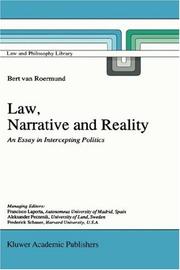
ISBN: 0792346211 9048148715 9401720517 9780792346210 Year: 1997 Volume: 30 Publisher: Dordrecht, Boston, London Kluwer Academic Publishers
Abstract | Keywords | Export | Availability | Bookmark
 Loading...
Loading...Choose an application
- Reference Manager
- EndNote
- RefWorks (Direct export to RefWorks)
Law --- Discourse analysis, Narrative. --- Language. --- Interpretation and construction. --- Law—Philosophy. --- Law. --- Political science. --- Political philosophy. --- Language and languages—Philosophy. --- Theories of Law, Philosophy of Law, Legal History. --- Philosophy of Law. --- Political Philosophy. --- Philosophy of Language. --- Political philosophy --- Administration --- Civil government --- Commonwealth, The --- Government --- Political theory --- Political thought --- Politics --- Science, Political --- Social sciences --- State, The --- Acts, Legislative --- Enactments, Legislative --- Laws (Statutes) --- Legislative acts --- Legislative enactments --- Jurisprudence --- Legislation --- Narrative discourse analysis --- Narration (Rhetoric) --- Analogy (Law) --- Construction and interpretation (Law) --- Construction and interpretation of statutes --- Interpretation and construction (Law) --- Statutes --- Statutory construction --- Judicial discretion --- Judicial process --- Legal certainty --- Language, Legal --- Legal language --- Legal style --- Style, Legal --- Bill drafting --- Construction --- Interpretation and construction --- Law - Language. --- Law - Interpretation and construction.
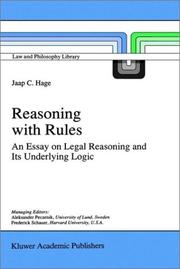
ISBN: 0792343255 9048147735 9401588732 9780792343257 Year: 1997 Volume: 27 Publisher: Dordrecht: Kluwer,
Abstract | Keywords | Export | Availability | Bookmark
 Loading...
Loading...Choose an application
- Reference Manager
- EndNote
- RefWorks (Direct export to RefWorks)
Rule-applying legal arguments are traditionally treated as a kind of syllogism. Such a treatment overlooks the fact that legal principles and rules are not statements which describe the world, but rather means by which humans impose structure on the world. Legal rules create legal consequences, they do not describe them. This has consequences for the logic of rule- and principle-applying arguments, the most important of which may be that such arguments are defeasible. This book offers an extensive analysis of the role of rules and principles in legal reasoning, which focuses on the close relationship between rules, principles, and reasons. Moreover, it describes a logical theory which assigns a central place to the notion of reasons for and against a conclusion, and which is especially suited to deal with rules and principles.
Law --- Reasoning --- Droit --- --Raisonnement --- --Logique --- --Methodology --- Logic. --- Reasoning. --- Methodology. --- Law—Philosophy. --- Law. --- Computers. --- Law and legislation. --- Artificial intelligence. --- Political science. --- Theories of Law, Philosophy of Law, Legal History. --- Legal Aspects of Computing. --- Artificial Intelligence. --- Philosophy of Law. --- Administration --- Civil government --- Commonwealth, The --- Government --- Political theory --- Political thought --- Politics --- Science, Political --- Social sciences --- State, The --- AI (Artificial intelligence) --- Artificial thinking --- Electronic brains --- Intellectronics --- Intelligence, Artificial --- Intelligent machines --- Machine intelligence --- Thinking, Artificial --- Bionics --- Cognitive science --- Digital computer simulation --- Electronic data processing --- Logic machines --- Machine theory --- Self-organizing systems --- Simulation methods --- Fifth generation computers --- Neural computers --- Automatic computers --- Automatic data processors --- Computer hardware --- Computing machines (Computers) --- Electronic calculating-machines --- Electronic computers --- Hardware, Computer --- Computer systems --- Cybernetics --- Calculators --- Cyberspace --- Argumentation --- Deduction (Logic) --- Deductive logic --- Dialectic (Logic) --- Logic, Deductive --- Intellect --- Philosophy --- Psychology --- Science --- Thought and thinking --- Acts, Legislative --- Enactments, Legislative --- Laws (Statutes) --- Legislative acts --- Legislative enactments --- Jurisprudence --- Legislation --- Methodology --- Law - Methodology --- Raisonnement --- Logique
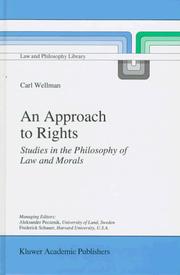
ISBN: 0792344677 9048148146 9401588120 9780792344674 Year: 1997 Volume: 29 Publisher: Dordrecht Kluwer
Abstract | Keywords | Export | Availability | Bookmark
 Loading...
Loading...Choose an application
- Reference Manager
- EndNote
- RefWorks (Direct export to RefWorks)
An Approach to Rights contains fifteen previously published but mostly inaccessible papers that together show the development of one of the more important contemporary theories of the nature, grounds and practical implications of rights. In a long retrospective essay, Carl Wellman explains what he was trying to accomplish in each paper, how far he believes that he succeeded and where he failed. Thus the author provides a critical perspective both on his own theory and on alternative theories from which he borrows, or that he rejects. These essays identify the problems any adequate theory of rights must solve, describe the more plausible solutions and weigh the merits of each. They will be of special interest to any reader concerned with legal theory, moral philosophy or any branch of applied ethics or social policy in which appeals to rights are frequently made but seldom rationally satisfactory.
Legal theory and methods. Philosophy of law --- Law and ethics --- Natural law --- Consent (Law) --- Human rights --- Civil rights --- Philosophy --- Moral and ethical aspects --- 810 Theorie en Methode --- 811 Filosofie --- 821.1 Volkenrecht --- 821.5 Mensenrechten --- 825 Ontwikkelingssamenwerking --- 841 Politiek Bestel --- 876 Veiligheidspolitiek --- -Human rights --- -Civil rights --- -Law and ethics --- Declaration of intention --- Justification (Law) --- Law of nature --- Natural rights --- Nature, Law of --- Rights, Natural --- Law --- Ethics and law --- Law and morals --- Morals and law --- Basic rights --- Civil liberties --- Constitutional rights --- Fundamental rights --- Rights, Civil --- Constitutional law --- Political persecution --- Civil rights (International law) --- Rights, Human --- Rights of man --- Human security --- Transitional justice --- Truth commissions --- Law and legislation --- Law and ethics. --- Natural law. --- Moral and ethical aspects. --- Philosophy. --- Consent (Law). --- Law of nature (Law) --- Nature, Law of (Law) --- Law—Philosophy. --- Law. --- Political science. --- Public international law. --- Constitutional law. --- Theories of Law, Philosophy of Law, Legal History. --- Philosophy of Law. --- Public International Law . --- Political Science. --- Constitutional Law. --- Constitutional limitations --- Constitutionalism --- Constitutions --- Limitations, Constitutional --- Public law --- Administrative law --- Law of nations --- Nations, Law of --- Public international law --- Administration --- Civil government --- Commonwealth, The --- Government --- Political theory --- Political thought --- Politics --- Science, Political --- Social sciences --- State, The --- Acts, Legislative --- Enactments, Legislative --- Laws (Statutes) --- Legislative acts --- Legislative enactments --- Jurisprudence --- Legislation --- Interpretation and construction --- Human rights - Philosophy --- Human rights - Moral and ethical aspects --- Civil rights - Philosophy --- Civil rights - Moral and ethical aspects
| Listing 1 - 10 of 10 |
Sort by
|

 Search
Search Feedback
Feedback About UniCat
About UniCat  Help
Help News
News